Six finalists named for Charlotte’s teaching excellence awards
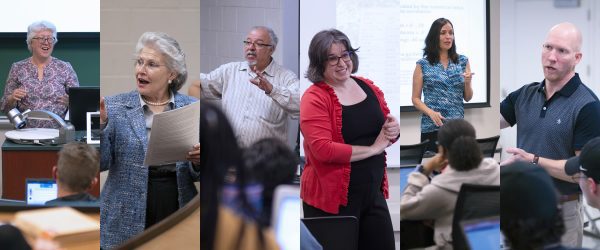
Creating supportive learning environments that enable students to succeed is a hallmark of Charlotte faculty members, and this year’s nominees for the University’s teaching excellence awards exemplify that commitment.
For the Bank of America Award for Teaching Excellence, finalists are Moutaz Khouja, professor, operations management; Adriana Medina, associate professor, reading and elementary education; and Linda Shanock, professor, psychological science and organizational science.
Carol Higham, senior lecturer, history; Cheryl Kane, senior lecturer, management; and Terry Shirley Jr., senior lecturer, geography and earth sciences, are this year’s finalists for the UNC Charlotte Award for Teaching Excellence.
Recipients for each award will be announced Friday, Sept. 30, at the UNC Charlotte Marriott Hotel & Conference Center. (Note: The awards ceremony was rescheduled for Dec. 5 due to inclement weather related to Hurricane Ian.)
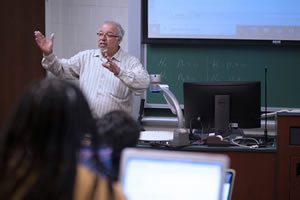 For Khouja, the classroom is a place where he can immerse himself and focus on teaching what he loves, while preparing students to be successful business professionals.
For Khouja, the classroom is a place where he can immerse himself and focus on teaching what he loves, while preparing students to be successful business professionals.
“I know that if I am enjoying the interaction with students, doing my best to teach them, encouraging their learning, responding to their questions and feeling pride in their achievements, then most of them will learn, achieve and make meaningful contributions to their profession.”
Khouja has made valuable contributions to the undergraduate curriculum by developing new courses and helping redesign the management information systems and operations majors. He is one of the pioneering faculty in developing online course modules proposed for the MBA program.
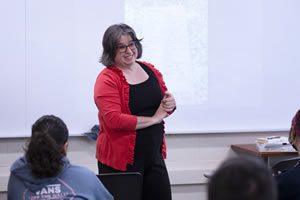 Medina is a global educator, and the world is her classroom. She strives to broaden the global and local perspectives of her teacher education students, so, in turn, they can broaden the perspectives of their K-12 students and prepare them to continue to address the challenges of our independent world.
Medina is a global educator, and the world is her classroom. She strives to broaden the global and local perspectives of her teacher education students, so, in turn, they can broaden the perspectives of their K-12 students and prepare them to continue to address the challenges of our independent world.
Through study abroad opportunities, Medina has expanded her students’ perspectives of education beyond the U.S., while enhancing their understanding of different cultures, languages and educational systems as they work with professionals and children in other countries. She developed study abroad programs in Brazil and Germany and has been integral in sustaining and creating academic partnerships with international institutions.
“To be a good global educator, I challenge myself to gain knowledge, form dispositions and build capacity within myself to understand, participate in and act on issues of local and global significance, as well as educate myself about cultures and regions of our world.”
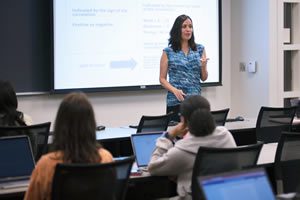 Shanock strives to create a supportive learning environment so that students of all backgrounds and ability levels feel they can voice their views, make contributions to class discussions and grow in their confidence with the material.
Shanock strives to create a supportive learning environment so that students of all backgrounds and ability levels feel they can voice their views, make contributions to class discussions and grow in their confidence with the material.
In her role as program director for the industrial/organizational psychology master’s program, and in her previous role as associate director of the interdisciplinary Organizational Science program, Shanock has engaged in numerous one-on-one mentoring activities with students.
“To be a successful educator, teaching and mentoring must permeate all three areas of our job as faculty members — scholarship, teaching and service. I believe in being a role model for our students in all aspects of my job. Doing so helps students know what it looks like to be a professional, successful, caring professor and mentor.”
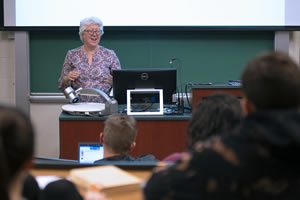 Higham is highly regarded by students and colleagues alike for her approach to teaching difficult historical subjects in a way that is engaging and results in open debates and discussions.
Higham is highly regarded by students and colleagues alike for her approach to teaching difficult historical subjects in a way that is engaging and results in open debates and discussions.
To support this inclusive environment, Higham employs a teaching philosophy to “create a safe, inclusive space where students can practice expressing and defending ideas that may be new to them and allow them room for failure and recovery.” This philosophy is shaped from the concept of learning more from failures than successes.
“I tend to teach tough subjects about race and inequality, which attracts a diverse group of students,” said Higham. “Students want to discuss those issues but are often not prepared to do so in a mature and cogent manner. Therefore, I include points in discussion where students need to try out new ideas.”
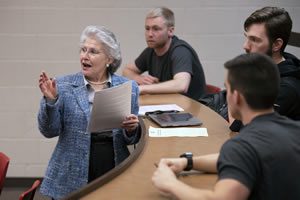 Kane expects nothing less than her students’ full potential and works tirelessly to help them achieve such. She accomplishes this through determination, respect, acceptance and perception.
Kane expects nothing less than her students’ full potential and works tirelessly to help them achieve such. She accomplishes this through determination, respect, acceptance and perception.
“Each student has a capacity to learn but not all of them have discovered their capacity,” said Kane. “I feel it is up to me to identify how best to awaken that sense of their first recognizing, ‘I can do this!’ and nurturing that to, ‘I want to do this the best that I can!’”
Kane uses a life-cycle approach in her teaching — using rigorous courses to teach students real-world lessons that extend beyond the classroom. She said, “It is monumentally rewarding when a student’s achievement has visibly changed their potential trajectory in life with the new skills they have at their avail, to establish their life goals, build their career and serve their future communities.”
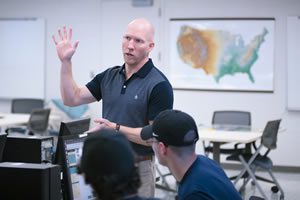 Shirley exudes passion. He is passionate about teaching and mentoring, the field of meteorology, advocating for students and supporting his colleagues. It seems every one of the 400-plus students he teaches each semester has been positively impacted by his classes and the care he extends toward each individual.
Shirley exudes passion. He is passionate about teaching and mentoring, the field of meteorology, advocating for students and supporting his colleagues. It seems every one of the 400-plus students he teaches each semester has been positively impacted by his classes and the care he extends toward each individual.
Shirley’s three-pillared teaching philosophy includes connecting with students from diverse backgrounds and experiences, experiential learning and teaching beyond the classroom. He fulfills this philosophy by valuing and encouraging differences in students, conducting hands-on, real-world classroom applications and preparing and connecting students with professionals to help position them for career excellence.
“Teaching at UNC Charlotte is truly a privilege — allowing me to mentor students, share my passion about weather and the environment and work with my colleagues to support students in their journeys,” said Shirley.
The UNC Charlotte Award for Teaching Excellence honors full- or part-time non-tenure track faculty members who have at least five years of teaching service at UNC Charlotte (lecturers and adjunct faculty). Eligibility for the Bank of America Award for Teaching Excellence, first presented in 1968, is for full-time, tenured faculty members with at least seven years of service to UNC Charlotte.